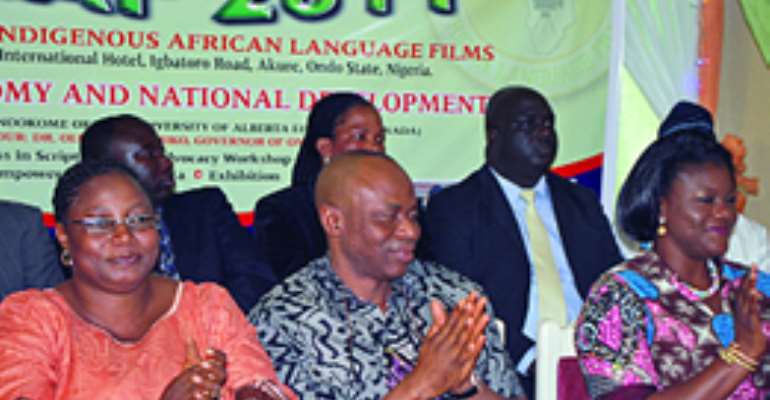USING INDIGENOUS FILMS FOR CULTURAL REVIVAL

The fifth edition of the Festival of Indigenous African Language Films (FIAF), which held at the Owena International Hotels, Akure, Ondo State, had come and gone. The scholarly event showcased films in African languages, with the theme: Film, Economy and National Development.
The fiesta was the brainchild of Remdel Optimum Communications Limited. The outfit headed by soft-spoken broadcaster of many decades, Mrs Biodun Ibitola, put up a sterling show that attracted scholars who brainstormed on the need for indigenous African language films to promote culture, value, and development as well as empowerment of women filmmakers.
Speaking during the welcome cocktail, Ondo State Commissioner for Culture and Tourism, Mr Deji Faleye, espoused the benign environment and tourism potentials of the state for visitors and filmmakers to shoot their movies. He highlighted the scenic topography and hospitable nature of the people, which makes it a destination point for tourists adding that the state is into the enterprise of making Ondo State what California is to the United States.
In her opening remark, the festival director, Mrs Ibitola, explained that the festival was to broadly expose indigenous African Language films with a view to exporting the intrinsic values and potentialities of Nigeria's rich culture to other civilizations. She said, if that was done, it would benefit the endangered local languages.
She stated that FIAF also strives to revamp the apparent relegation of African cultural heritage in favor of foreign ideas, concepts and culture that undermine the nation's innate potentials for growth, progress and development.
She said that the time was ripe for Africans to combine traditions that are unique to culture, with available modern economic, scientific and technological resources for the necessary development that we strongly desire through filmmaking.
Her words: 'Filmmakers must seek to optimize our cultural potentials for our economic well-being. We must emulate the emerging prosperity in East-Asian countries where people hold on to their values and at the same time, earn for themselves, higher living standards that surpass those obtainable in some industrialized world.'
She revealed that this year's festival sought to mobilize filmmakers and stakeholders in the entertainment industry to pay attention to the opportunities for growth and development within the context of our cultural realities.
She added that since culture has been universally acclaimed to rank alongside education, science and communication as indicators of real development, it behooves on all to mobilize others culturally. She urged governments from the local councils to the federal level as well as established institutions created to have oversight functions on film and culture, to wake up to their responsibilities.
In her message to the practitioners, Ibitola charged them to discharge their responsibilities to the continent and their respective countries and families by connecting to their environment, traditions and heritage as expressed in their languages, adding that economic advancement, political prominence and technological breakthroughs are indications of the cultural make up of the people involved. 'Any people that despises their cultural heritage will find it difficult to excel economically and will be technologically difficult. This is supported by history and law of nature,' she added.
In his presentation entitled: Language of indigenuity and the Nigerian Cinema, Professor Onookome Okome of the Department of English and Films Studies, University of Alberta, Edmonton, Canada, said that the estimation of Nigerian Cinema has always been different depending on who is involved at one point or another, adding that by estimate, Nigeria's Nollywood employs more people than any single branded industry in Nigeria.
He said that the industry has done so much, what government has been trying to do for many years pointing out that in less than 20 years, Nollywood industry had reshaped the image within and outside the country.
According to Okome: 'The industry is an image making organ that has demonstrated that we can truly take care of our image, protecting it the way we want and allow others to criticize it as evidenced by government's promulgation of the indigenization decree.
Though it was not properly articulated and implemented.'
He disclosed that 'while Nigeria has been busy discussing how to decolonize television screens for the past 60 years, the Nollywood industry has done so in less than 30 years, yet the success of the industry still has its own problems that needs to be carefully articulated, since it bears on our very being as a people.
